iPhone 15 Plus Review: Excellent in all key areas
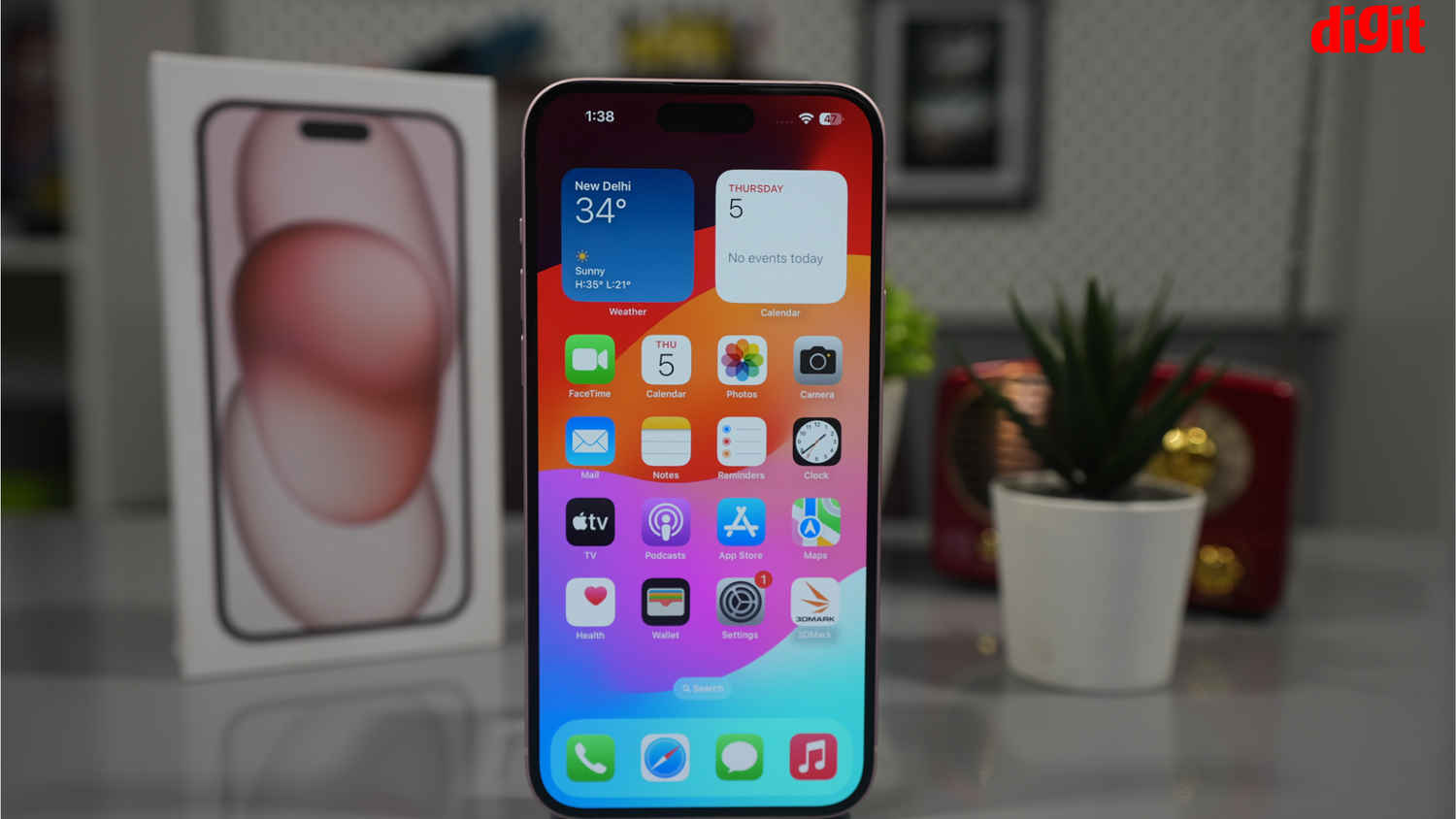
- Long-lasting battery life
- Speedy performance
- Versatile cameras
- USB-C charging
- Charming design with matte rear panel
- Dated 60 Hz display
- Slow charging
- USB 2 data transfer speeds
The iPhone 15 Plus is one of the most well-rounded Apple phones of recent years – it gives you enough to justify its exorbitant price but not too much to take away from the allure of the Pro devices. At a starting price of ₹89,900, the iPhone 15 Plus boasts some of the best performance, camera, and battery chops in the industry at the moment. Although the chipset has stayed the same as the 14 Pro Max, I saw enough of a performance uptick to recommend this phone over the iPhone 14 Pro to most users if they’re okay with missing out on the telephoto lens. You’ve also got meaningful Pro-level upgrades such as the fantastic camera setup, the battery life, and the solid performance. The software experience is as polished as ever, and the new design brings some level of premium air to the vanilla iPhones.
The new iPhone 15 series has made a colossal splash in the smartphone market. The Pro series has taken the world by storm with its new titanium chassis and upgraded chipset, alongside criticisms regarding poor durability and heating issues. The vanilla iPhone 15 and iPhone 15 Plus models, on the other hand, have largely been appreciated due to the sheer number of upgrades they have on offer – you get a slightly upgraded design, a brighter display, the A16 Bionic chipset, the upgraded 48-megapixel camera capable of shooting 24-megapixel default shots, USB-C charging (FINALLY!) and of course, Dynamic Island. It’s safe to say that this is one of the most substantial upgrades the vanilla iPhone models have seen. The iPhone 15 Plus, which I’m reviewing, even benefits from having a larger capacity battery. And you get all of this at the same price as the iPhone 14 Plus when it launched last year. The specifications and features look drool-worthy on paper – a Pro in almost every way but its name. However, does the iPhone 15 Plus warrant you spending a hefty ₹90K and how does it fare against competition? Let’s delve further into that in my detailed iPhone 15 Plus review.
iPhone 15 Plus Review: Build and design
The iPhone 15 Plus looks very charming – the subtle pastel hues look classy. It is definitely a tad muted compared to the iPhone 14s, so it depends on your personal aesthetic how you take to this change, coming from the bold colours of the previous generation. The aerospace-grade aluminium frame is ever-so-slightly contoured around the edges, making this phone more comfortable to hold, but I still won’t say that it’s the most comfortable form factor due to its size and weight.
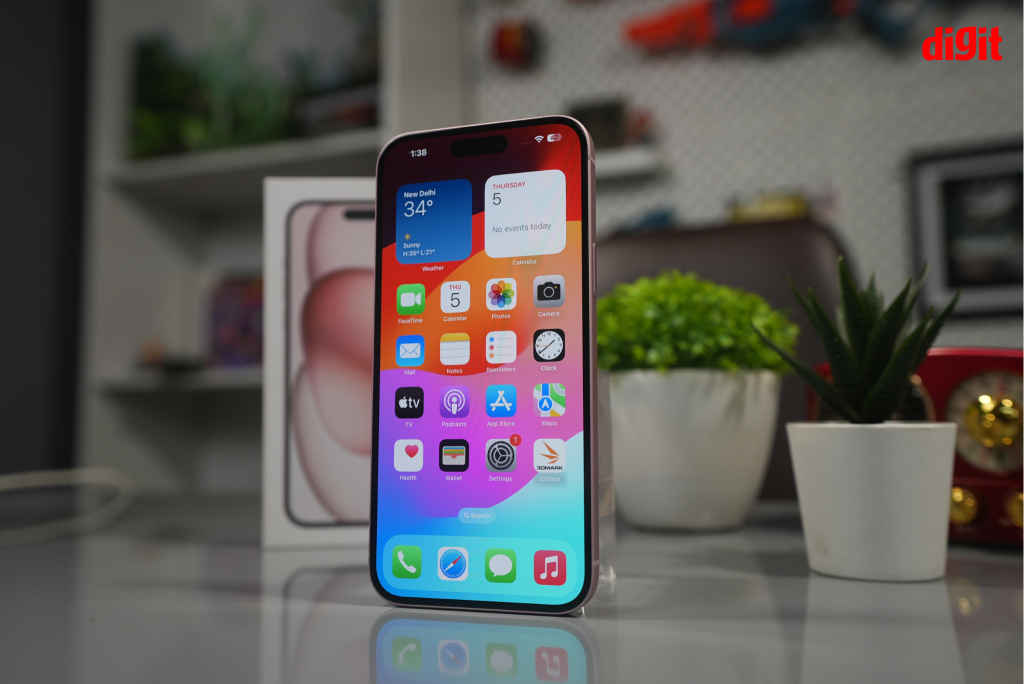
The weight, however, is pretty well distributed – Apple has done a good job with this. I found the phone quite slippery though, so I recommend donning a case when using the iPhone 15 Plus. I got the Pink-coloured unit for review, and although I have a personal aversion to the colour, I found this pastel pink hue pretty palatable. Additionally, Apple has introduced a soft-matte finish on the vanilla 15s this year, replacing the glossy finishes. I’m a big fan of this change because it essentially bids goodbye to fingerprint marks and smudges. The phone feels uber premium – well worth its asking price. Apple says it has used a new colour treatment technology that fuses the back panel with the colour. Pretty neat.
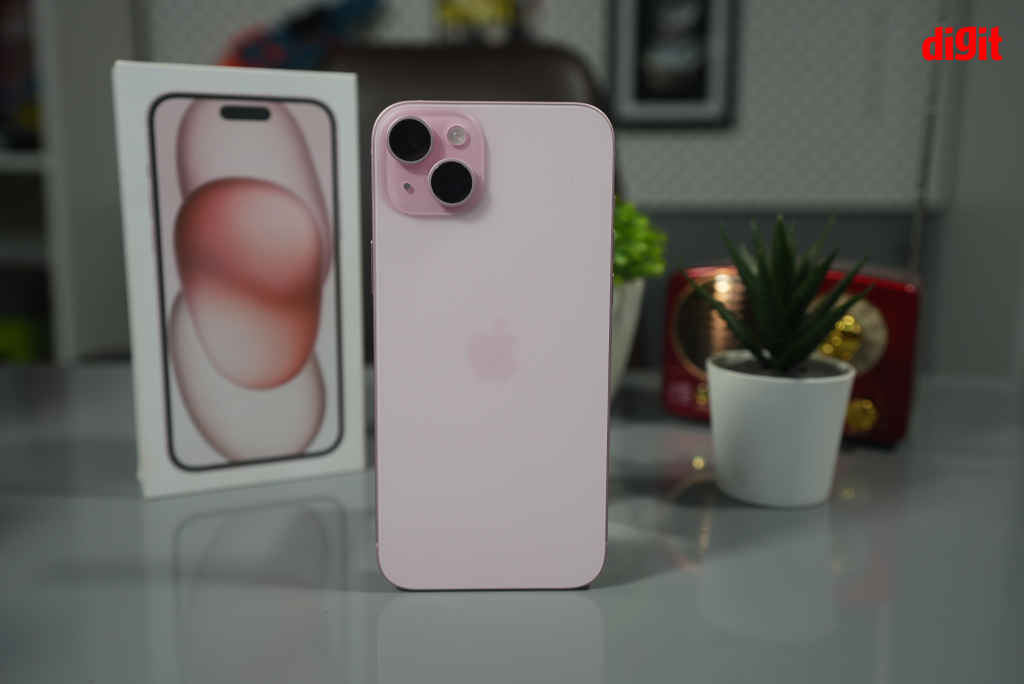
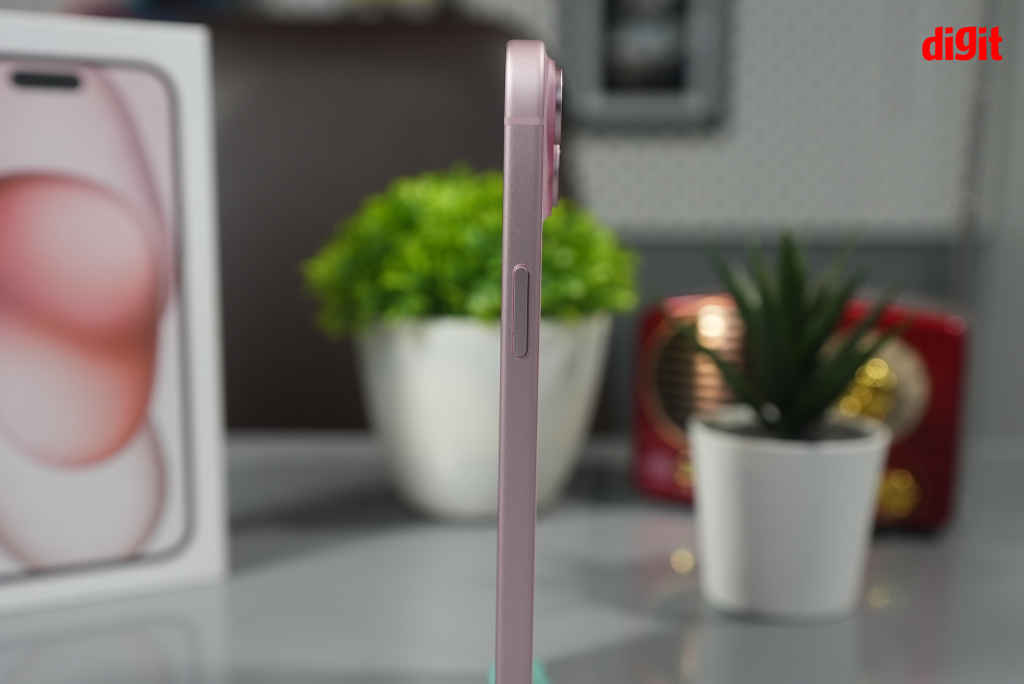
One of the biggest changes is that Type-C has replaced the Lightning port (RIP). This means you can charge all your devices with the same cable, and USB-C phone accessories will likely become more widespread with improved quality. It’s a win for the Android world as well. Unlike the Pro models, the speeds top out at USB 2, though with a peak data transfer speed of 480 Mbps, which is about the same as Lightning. I hope to see Apple offer USB 3 speeds across the board next year *fingers crossed*.
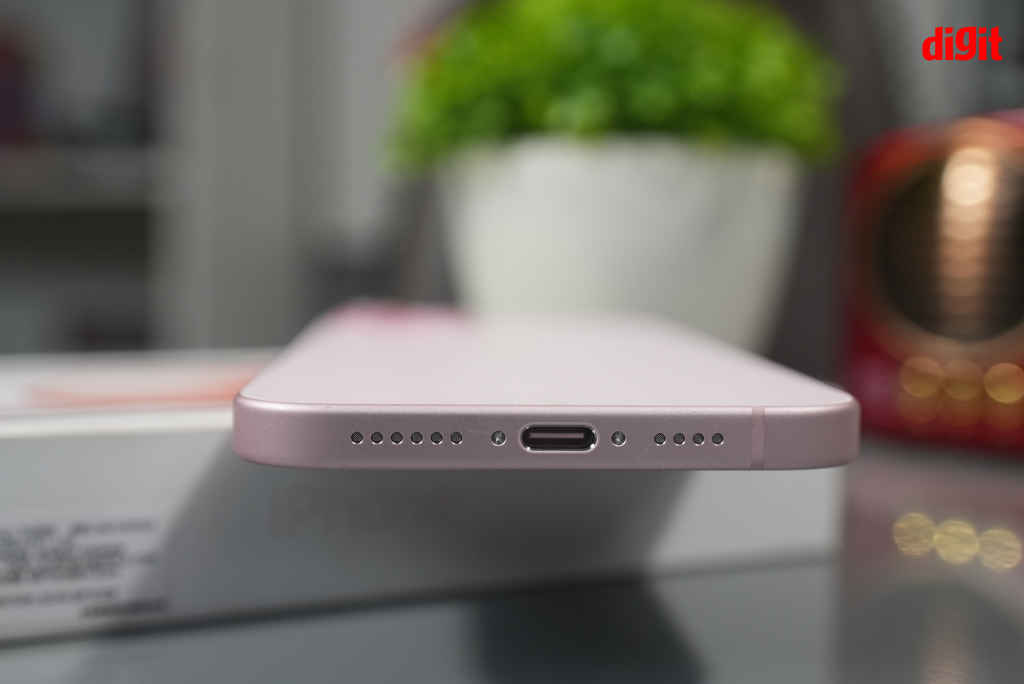
An iPhone 15 Plus review would be incomplete without mentioning some of the usual niceties like FaceID (as seamless as ever), IP68 dust and water resistance, and the mute switch. The iPhone 15 Plus also benefits from Dynamic Island this year, which gives the phone a unique look and is pretty useful for multitasking and being aware of what’s happening in your phone’s apps in the background.
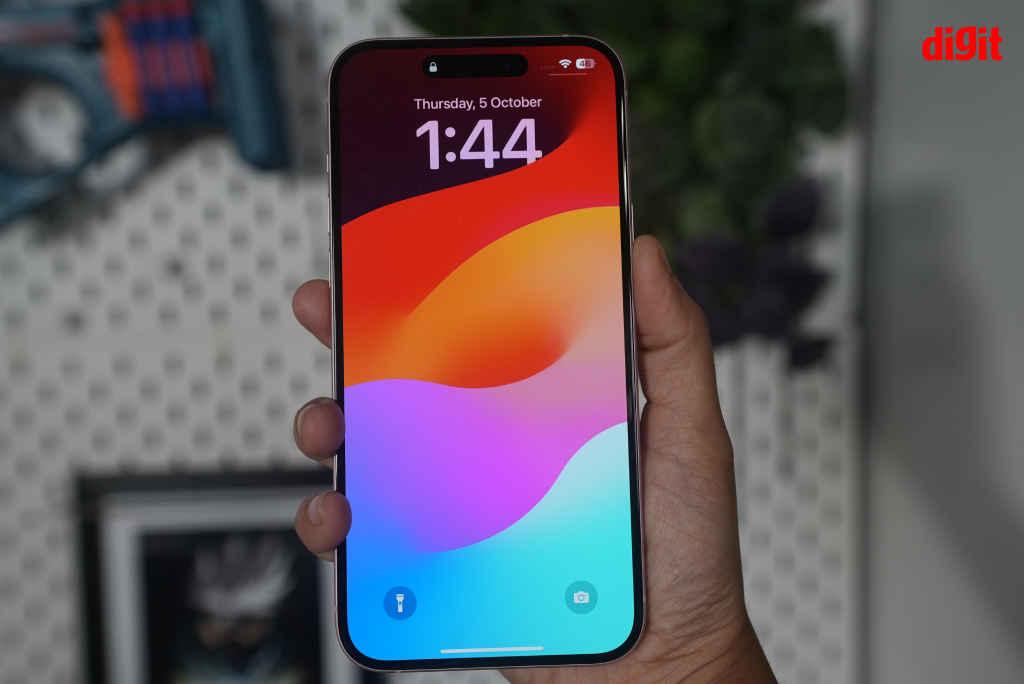
Being a large phone, the iPhone 15 Plus is still quite unwieldy; however, the design language and build scream premium – which is what you paid for.
iPhone 15 Plus Review: Display
I’m a big fan of iPhone displays – the symmetrical bezels are always a huge win in my book, and this time around, they’re slimmer as well. The 6.7-inch Super Retina XDR OLED panel looks fantastic with accurate colours, excellent viewing angles and impressive brightness levels. HDR content looks great and there’s support for Dolby Vision as well. The brightness is one of the key upgrades this year, with the peak brightness going all the way up to 2000 nits, according to Apple.
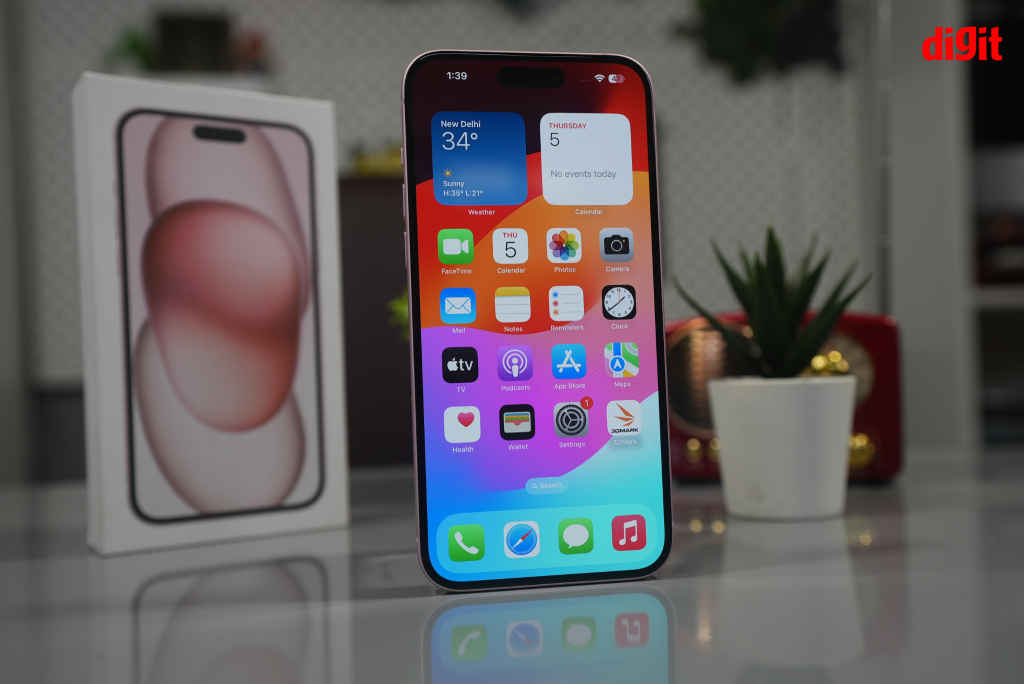
In my tests, I got a reading of 1,785 nits of peak brightness in Auto mode under direct sunlight – very impressive stuff. So, screen legibility will not be an issue whatsoever. Unfortunately, apart from the brightness levels, the displays have remained the same compared to last year’s models. There’s no ProMotion on the vanilla models, so the refresh rate is stuck at 60 Hz, which is baffling in 2023. You can tell the difference from 120 Hz screens if you have a keen eye. You can especially tell the difference if you keep the iPhone 15 Pro (or even last year’s 14 Pro) and iPhone 15 Plus side by side.
Another feature missing is the Always On display. The AOD on the Pro models looks fantastic – albeit a bit too bright to be efficient, so it’s unfortunate that the vanilla models miss out on this. Apple’s new Standby Mode does work, but it’s not as useful since you have to touch the display to view it – it kind of destroys the point of a Standby Mode.
iPhone 15 Plus Review: Performance
When Apple announced that the vanilla iPhone 15 models would feature last year’s A16 Bionic chipsets with *improved* performance, I won’t lie; I felt my eyes roll a bit. However, to my surprise, the performance improvements compared to last year’s iPhone 14 Pro Max – which featured the same chipset – shocked me. Alongside the A16 Bionic chipset, you also get Apple’s 5-core GPU, 6 GB of RAM, and up to 512 GB of onboard storage with no expansion option.
In AnTuTu, the iPhone 15 Plus astounded me with a score of more than 1.4 million – a HUGE uptick compared to the 9,68,642 score of last year’s iPhone 14 Pro Max. It even beat competitors such as the Samsung Galaxy S23 Ultra, Xiaomi 13 Pro, and Vivo X90 Pro. However, the newest foldable from the house of Samsung held a small lead in AnTuTu. In GeekBench though, there was no competition, with the iPhone 15 Plus bringing in a significantly higher score than all other competitors.
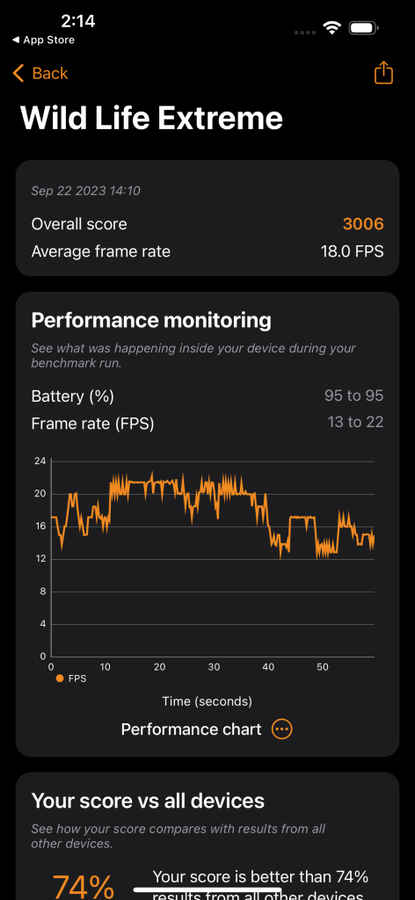
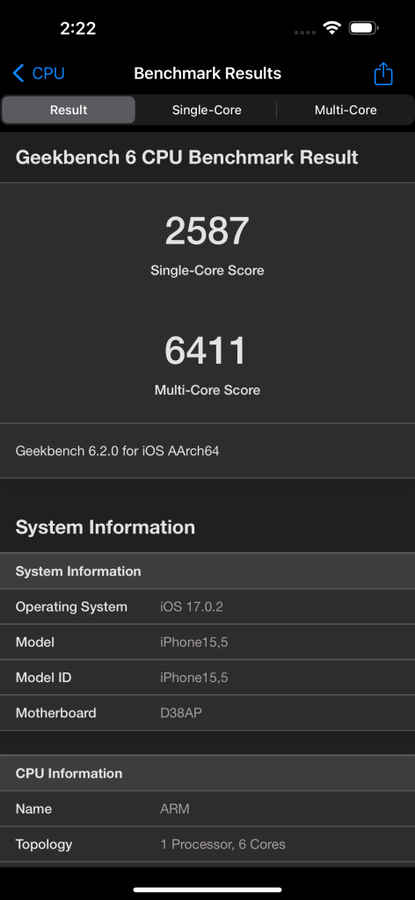
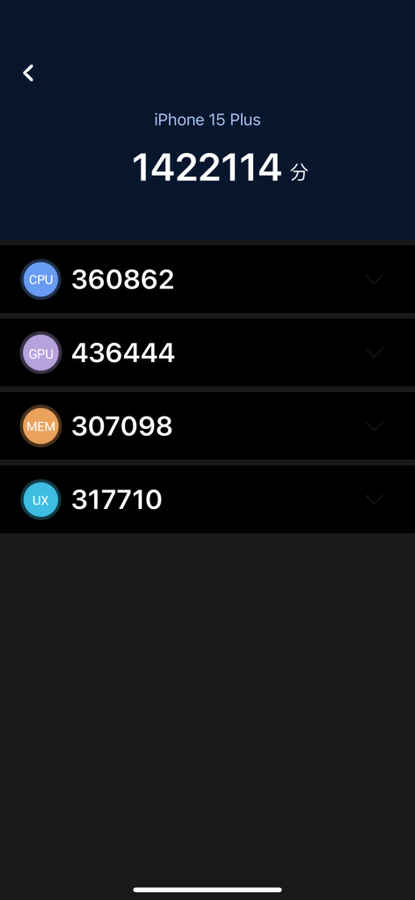
Moving on to GPU benchmarks, the iPhone 15 is noticeably behind most modern-day Android flagship phones. It scored 3,006 points in 3D Mark Wild Life Extreme, which is decent enough. However, in GFXBench, the iPhone 15 Plus’ benchmark scores did not hold a candle to the Galaxy S23 Ultra, Vivo X90 Pro, and Xiaomi 13 Pro.
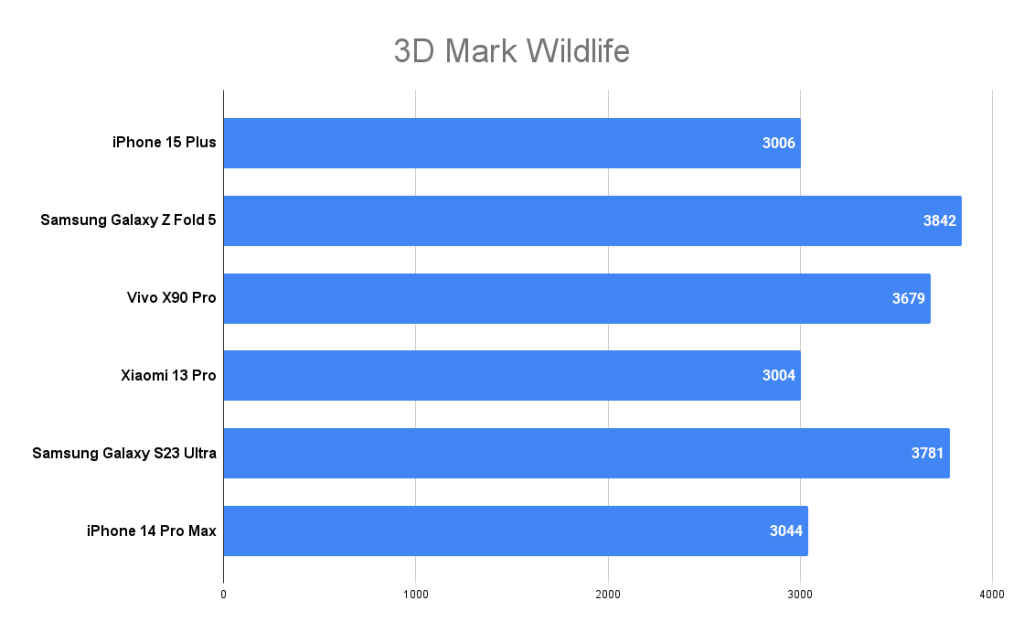
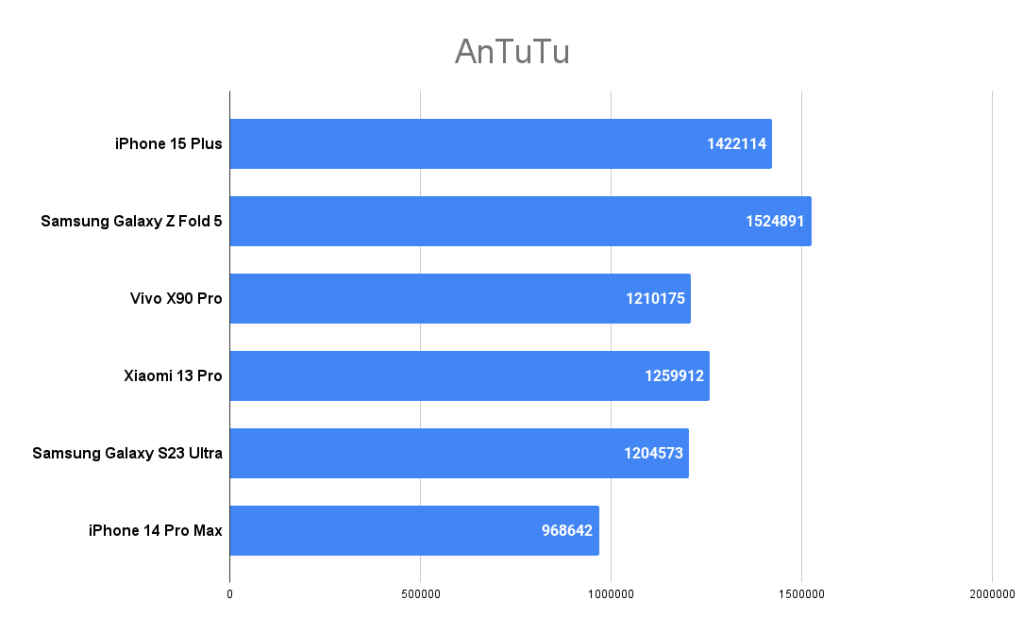
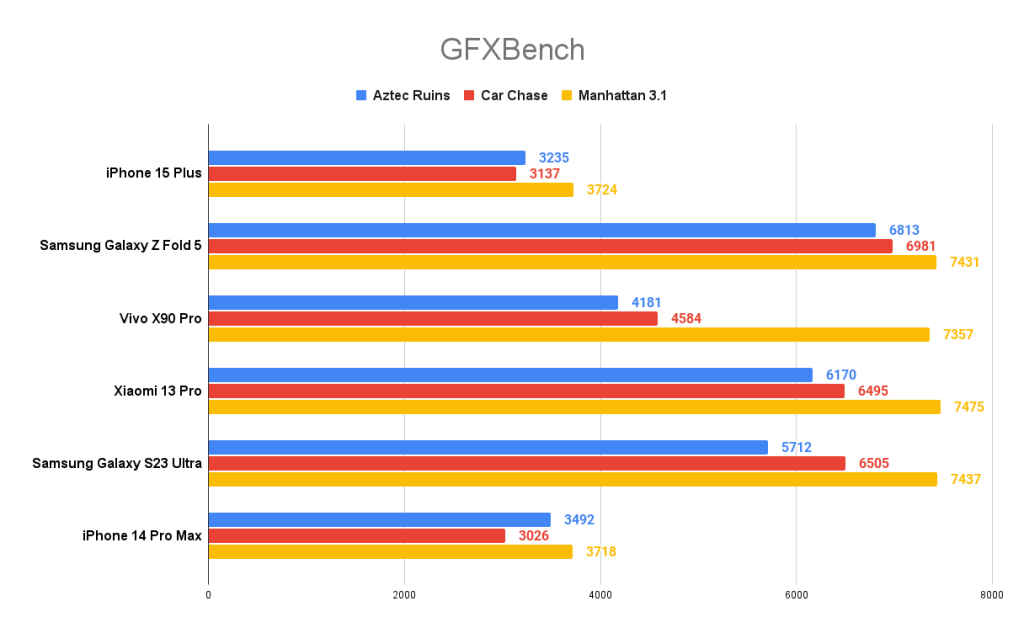
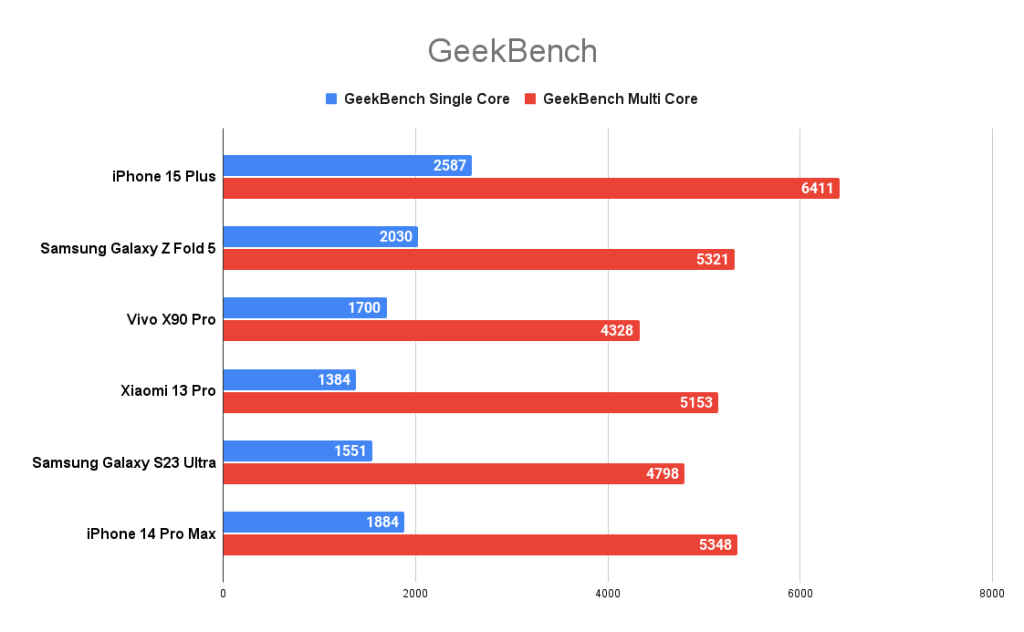
Synthetic Benchmarks don’t always tell the full story though. I never felt a lack of performance when gaming or doing intensive tasks. Playing games such as BGMI and Call of Duty: Mobile is smooth, with the phone running at maximum settings without too much lag. I did notice slight heating after 20-ish minutes of running COD: Mobile, but it isn’t unmanageable. I even edited a 4K video, and the phone exported the edited file in a jiffy.
Daily tasks on the phone are smooth, animations look great, and the entire experience is extremely fluid. Apple has nailed the fluidity of the phones for a while now, and there’s no change in that regard, which is a good thing. iOS 17 is more customisable than ever with Widgets and Lock Screen customisation options; however, true customisability does still come on the side of Android.
What is lacking is data transfer speeds, which lag behind competitors considerably. All in all, though, the iPhone 15 Plus is a powerhouse, capable of pretty much anything you throw at it.
iPhone 15 Plus: Upgraded cameras for the win!
The cameras are possibly one of the biggest upgrades on the vanilla iPhone 15s. The iPhone 15 Plus has finally ditched the 12-megapixel sensor and replaced it with a 48-megapixel shooter that snaps 24-megapixel shots by default. This means more information and data in the shots, making them more detailed. This doesn’t work in Low Light though. You also get improved dynamic range, finally addressing some of the less-than-ideal HDR abilities of the previous-gen models. There’s also a 2x sensor crop zoom which is pretty close to optical quality.
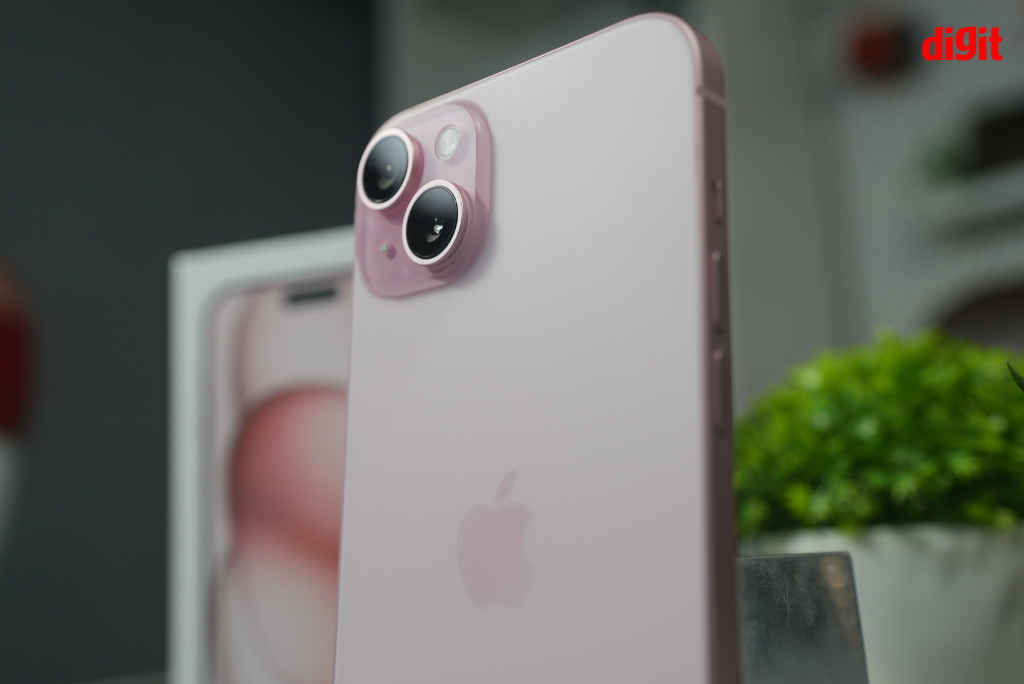
A 12-megapixel ultrawide shooter and a 12-megapixel selfie camera accompany the main camera. You can’t shoot in 48 MP ProRaw though; that is limited to the Pro models.
Pictures out of the primary camera look rich and sharp in daylight. It provides outstanding results in pretty much all conditions including tricky lighting, where it does a great job of exposing highlights and shadows in a balanced way. The colours also look very natural, which is excellent when clicking pictures of human subjects.
Portraits, as expected, look excellent. The edge detection is par excellence, the colours are natural, and the pictures are sharp and detailed. The new iPhones have even started capturing portrait depth data for pictures of human subjects and pets, so if you click a normal photo and wish to turn it into a portrait one, you can do that after the fact. Now, Samsung’s flagships can also do this, but it is software-enabled, so you can see the difference in quality.
Ultrawide photos from the 12-megapixel camera look almost as good as photos from the main camera. Colour science consistency is excellent, and there’s no tangible barrel distortion.



Low-light pictures from both cameras come out looking fantastic and detailed. In fact, low-light portraits are possibly the best in the market right now. The selfie camera also provided great results in both daylight and low light. Details on the face are well-maintained, and colours look realistic. There’s no aggressive smoothening of textures as well.



You can record up to 4K at 60 fps, and the footage looks slick. Video footage from the phone is rich in details, there’s no choppiness whatsoever, and transitions between different zoom levels are seamless. You can also choose to shoot in Cinematic Mode and there’s an option to tune the levels of blur and point of focus after shooting the video, which is very neat.
iPhone 15 Plus Battery Review
The iPhone 15 Plus has reached ridiculous levels of battery life. It has, by far, the longest battery life of any iPhone to date that we’ve tested. The phone houses a 4,383 mAh battery and supports 20 W charging. You also get support for 15 W wireless MagSafe charging and 7.5 W Qi wireless charging.
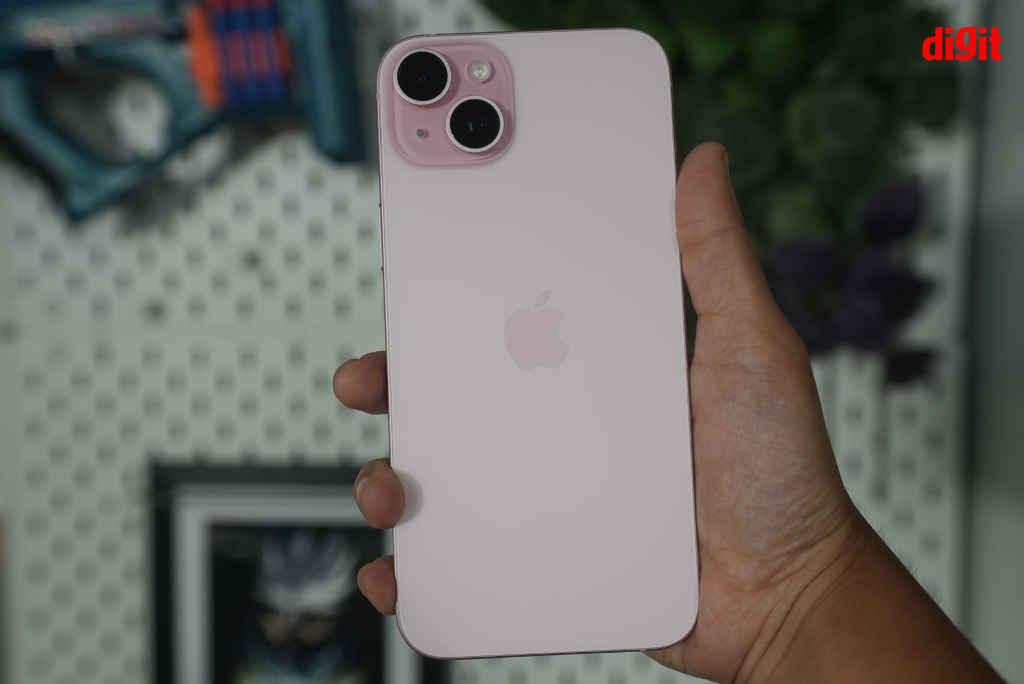
I put the iPhone 15 Plus through our usual slew of battery tests, and it outshone every flagship of 2023. In our usual 4K video loop test, the iPhone 15 Plus clocked in an impressive 21 hours and 22 minutes runtime. I consistently got 8-9 hours of on-screen time daily, and my day included activities such as gaming, social media, WhatsApp, email, and camera use. If battery life is your primary concern, the iPhone 15 Plus has your back. However, the slow 20 W charging speeds are a bummer. The phone takes more than 1.5 hours to charge from empty to full, which is essentially as good as charging at a snail’s pace in 2023.
Should you buy the iPhone 15 Plus?
The iPhone 15 Plus is one of the most well-rounded Apple phones of recent years – it gives you enough to justify its exorbitant price but not too much to take away from the allure of the Pro devices. At a starting price of ₹89,900, the iPhone 15 Plus boasts some of the best performance, camera, and battery chops in the industry at the moment. Although the chipset has stayed the same as the 14 Pro Max, I saw enough of a performance uptick to recommend this phone over the iPhone 14 Pro to most users if they’re okay with missing out on the telephoto lens. You’ve also got meaningful Pro-level upgrades such as the fantastic camera setup, the battery life, and the solid performance. The software experience is as polished as ever, and the new design brings some level of premium air to the vanilla iPhones.
Apple iPhone 15 Plus Key Specs, Price and Launch Date
| Release Date: | 12 Sep, 2023 |
| Market Status: | Launched |
Key Specifications
Screen size (in inches)
6.7
Rear Camera Megapixel
48
Battery capacity (mAh)
4300
Storage
256
Dhriti Datta
Perpetually sporting a death stare, this one can be seen tinkering around with her smartphone which she holds more dear than life itself and stuffing her face with copious amounts of bacon. View Full Profile













